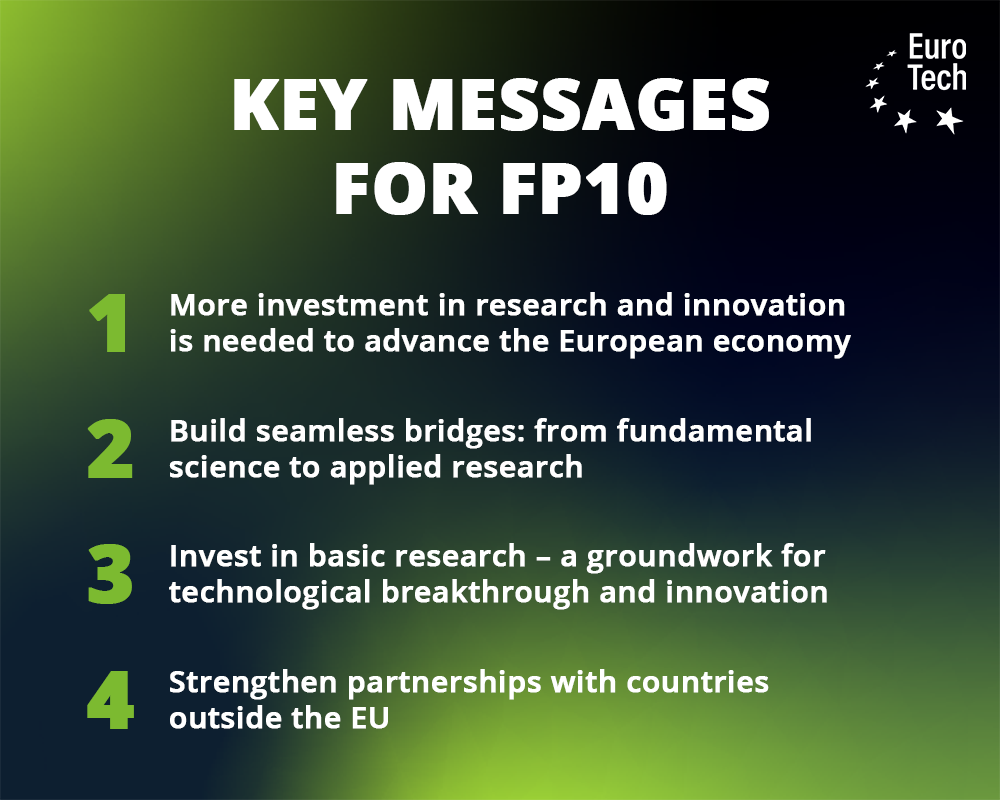12 March 2024 | Our vision for the future of research and innovation is grounded in strategic foresight and a commitment to address global challenges. Shaping the next Framework Programme for Research and Innovation, FP10, we focus on a comprehensive perspective that recognises the current strengths of Horizon Europe and identifies areas for enhancement and refinement.
EuroTech’s position paper underscores the significance of science and technology universities as key players in this transition. Aligning academic research with real-world challenges, we aim to foster a dynamic ecosystem promoting technology transfer and maximising the societal impact of research.

Recommendations
1. More investment in research and innovation is needed to advance the European economy
The budgetary negotiations ahead will be challenging, allocating resources to FP10 and other competing priorities within the EU. Nevertheless, research and innovation deserve to be recognised as crucial priorities rather than merely receiving residual allocations.
Maintaining the European Union at the forefront of research and innovation depends on the EU substantially increasing its budget for the upcoming Framework Programme. Failing to do this will jeopardise the committed 3% GDP target. European R&I faces environmental, socio-economic, and geopolitical challenges. Furthermore, European R&I is in a transition phase: creating a single market for researchers, the energy transition, and so on. It is vital that national and EU agendas are further aligned. Investment in capacity and skills in academia is needed to drive the transformation in FP10. Considering these challenges, we propose doubling the budget to 200 billion euros.
Budget transparency instils confidence and trust in the EU’s financial affairs. We strongly support those who advocate for budget stability to eliminate the annual debates about budget cuts, which hinder long-term research planning and innovation initiatives. The constant initiation of new programmes without sustained funding threatens the stability of ongoing projects and diverts resources away from core research and innovation actions.
It is evident that the United States and China are outpacing the EU in research and innovation investments, posing a risk to Europe’s competitiveness. By doubling the budget for the next Framework Programme and ensuring budget transparency and stability, the EU can strengthen its position as a global leader in research and innovation, fostering economic growth and sustainable development for the benefit of its citizens and the world at large.
2. Build seamless bridges: from fundamental science to applied research
Horizon Europe’s future, and particularly Pillar 2, will only be assured when more open-ended topics are incorporated – akin to the approach taken by the European Innovation Council (EIC) funding model. By formulating broad problem statements and allowing researchers, innovators, industry and societal actors the flexibility to identify the most promising solutions, we can enhance the long-term impact of collaborative research in addressing global and societal challenges.
Within Pillar 2, there is a compelling need to support further collaborative basic research, especially that related to technology with a targeted Technology Readiness Level (TRL) between 2 and 4. These calls are essential to the innovation cycle, acting as the bridge from fundamental to applied science.
3. Invest in basic research – a groundwork for technological breakthrough and innovation
We advocate for a substantial increase in funding for research and innovation in the upcoming Framework Programme. Basic research specifically is crying out for additional resources.
Investing in basic research is a vital investment in the future. While applied research may yield more immediate results, the long-term impact of basic research cannot be overstated. It lays the groundwork for future technologies and has the potential to contribute hugely to complex societal challenges.
Investing in basic research ensures that the European Union remains at the forefront of scientific advancements, contributing to global scientific leadership and collaboration.
4. Strengthen partnerships with countries outside the EU
The association of countries outside the EU to FP10 is paramount for the European Union, aligning with the strategic imperatives outlined in the Horizon Europe Strategic Plan 2025-2027. That plan underscores the significance of international collaboration, particularly in the face of global crises that transcend borders. Challenges such as climate change, health crises, and geopolitical tensions demand and deserve a coordinated and collective response.
EuroTech strongly advocates for expanding the scope of cooperation beyond the EU. For European countries with a long history and a broad experience of FP participation (notably the UK, Switzerland), collaboration should be stable, barrier-free and not complicated by wider political debates. Beyond Europe, we propose that FP10 actively engages with like-minded countries of strategic importance to the EU that are committed to the EU’s fundamental values. Such engagement ensures that FP10 can play a pivotal role in addressing global challenges, driving innovation, and establishing enduring and mutually beneficial relationships.
About
The EuroTech Universities Alliance is a strategic partnership of leading European universities of science and technology joining forces to build a strong, sustainable, sovereign, and resilient Europe. The partners bring their excellence in research and education, their active engagement in vibrant eco-systems and service to society. Together, they join forces to accelerate their research in high-tech focus areas and advocate for change, through dedicated partners and a strong presence in Brussels.





